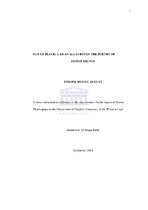| dc.description.abstract | The main aim of my dissertation is to re-evaluate the poetry of the South African writer Dennis Brutus (1924-2009). Even though he produced a substantial number of poems over more than half a century, his work continues to receive limited attention in South African literary criticism. One of the main reasons is the perception that he was primarily a political activist who wrote poetry with the purpose of advancing his political objectives. However, even though he wrote extensively on political issues, his themes include a wide range of subjects. In addition, he paid close attention to the craft of poetry. Due to the tendency to foreground the political content of his writing, the complexity and diversity in the language and style of his poetry are seldom examined. Refocusing attention on the aesthetic features of his work is a key aspect of my dissertation. I also contend that, despite the political content of much of his poetry, Brutus remains, first and foremost, a writer of lyric poetry. What makes his writing different from the conventional lyric, though, is his quest to find ways of using a very personal mode of poetic expression to make statements on public matters. How he pursues this objective is a major focus of my dissertation. I examine various literary influences on his writing as well. Brutus initially drew extensively on the traditional English literary canon he was taught at school and at university. Later, in order to communicate more directly and accessibly, he drew on traditional Chinese poetry. For the same reason, he subsequently wrote some poems with the specific objective of public performance. My re-evaluation of Brutus’ poetry is primarily based on a contextual reading of his work. Such an approach is based on the notion that the context within which a writer lives and writes is vital in order to gain a more informed understanding of his or her writing. In addition, my dissertation draws on Homi K. Bhabha’s elaboration of Freud’s notion of the “unheimlich” (“unhomely”) to examine Brutus’ life and poetry. Bhabha pays particular attention to the sense of estrangement which is embedded in Freud’s theory. His elaboration provides an important conceptual tool with which to analyse Brutus’ writing, and makes it possible to identify links among his various poetic personae and to identify common features in the themes of his poetry. I argue that Brutus’ unhomelineness lies at the centre of his poetic personae – the troubadour, the exile and the cosmopolitan – and of most of the themes of his poetry. Another important focus of my dissertation is how Brutus responds to this state of unhomeliness. The central aspect of my argument is that he redefines his sense of self during different periods of his life: he evolves from initially being a patriot in South Africa into a rooted cosmopolitan in exile; he then, finally, becomes a rootless cosmopolitan. I explore the reasons behind this evolution, and contend that these shifts were essentially attempts to regain agency over his life. | en_US |

